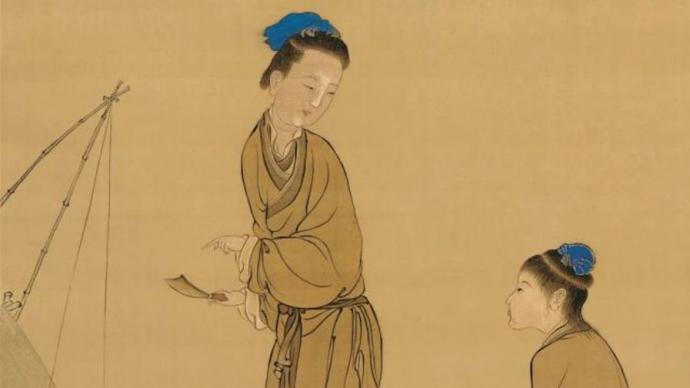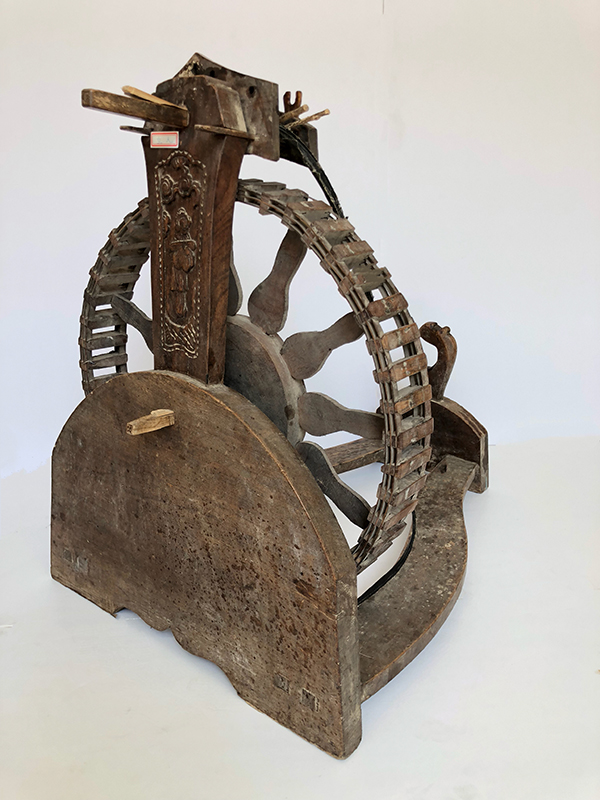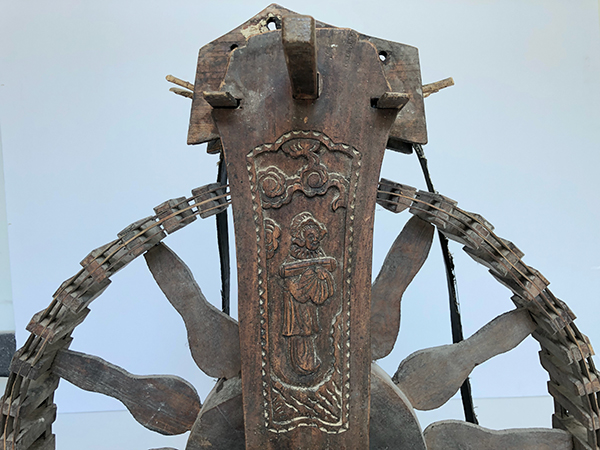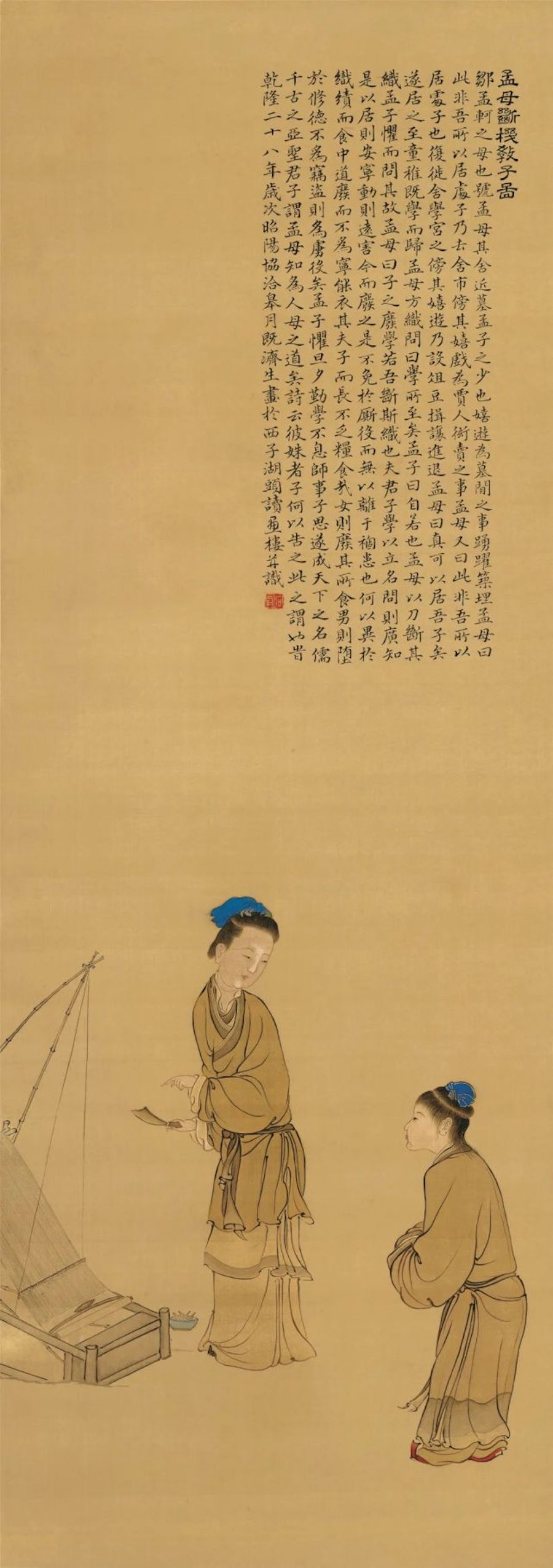
Editor 's note: Folk customs related to festivals and solar terms have been passed down for thousands of years and contain the wisdom and culture of ancestors. In modern society, we are drifting farther and farther from traditional folk customs, but at a certain moment, we will still be amazed by the names of the twenty-four solar terms such as Qingming and Grain Rain, and will be moved by the Lantern Festival's "flower market lights like day", and will be in the Spring Festival. and the Mid-Autumn Festival from a distant hometown to the hometown. Folklore is the memory that belongs to the Chinese people flowing in the blood.
The Paper, in cooperation with the Folklore Institute of East China Normal University, has launched a traditional folk festival column to introduce those festivals that are very important in traditional Chinese culture and related folk customs. These folk customs have not disappeared and are still in our daily life.
The second Sunday in May is Mother's Day, which is May 8 this year. The love of mothers for their children is often selfless and unrequited in return. Therefore, after the birth of Mother's Day, it spread quickly and became a memorial day for people to thank their mothers.
Coincidentally, the day before Mother's Day this year is the sixth day of the fourth lunar month, which is Huang Daopo's birthday. This woman who improved cotton textile technology made Songjiang Prefecture cotton cloth sold throughout the country. Because of the life of "clothing the world", Huang Daopo was also honored as "Huang Mu" by people.
Starting from "Huang Mother", Tian Zhaoyuan, a professor at East China Normal University, mentioned another meaning of "mother". Because mothers have selfless and great love, in addition to the "mother" in kinship, we will also refer to the person or thing that gives us the grace of nurturing as "mother". "Chinese mothers like Huang Daopo also There are many, each with outstanding virtues and talents."
"Chinese Mothers" Link National Identity
"Wunijing Temple worships Huang Po, and there are many three forests. Food and clothing are my people's true mothers, and I will play strings and songs for thousands of autumns." Fang Yun, a lecturer at the School of International Education of Shanghai University and a Ph.D. A tribute to Huang Daopo.
Huang Daopo was from Wunijing Town, Songjiang Prefecture (now Huajing Township, Minhang District, Shanghai). She learned advanced cotton textile technology from Yazhou, Hainan, and returned to Wunijing to teach skills. Nijing is popular in the north and south of the river, and it also brings rich income to the local people. After Huang Daopo's death, the local people cherished her kindness and built a shrine to commemorate her. In later generations, on the birthday of Huang Mu, everyone will go to the temple to worship Huang Daopo. "Family and food are my people's true mothers", which expresses everyone's love for this "Huang Mu" who selflessly taught the skills and kept the locals fed and clothed. Affection.
Records in some historical materials also restore the people's respect and love for the "Huang Mu" at that time. Her ancestral hall is very beautiful: "The main hall has three syllables, and the main hall and the room are extremely beautiful. In addition, there are blisters for offering sacrifices, and Yan enjoys the order." On weekdays, the incense is strong: "The nunnery worships Huang Po, and the statue of the old woman is always incense. The most prosperous, every autumn is successful, acting to reward the gods." On his birthday, textile practitioners and people from nearby counties come to worship: "Nearby counties, cheering and admiring, holding fishy cooked, holding incense mulberry, hunched and enthusiastic, muddy Those who are on the first step, rub shoulders and heels." …

Similar to "Huangmu" is the "first silkworm" Huangdi Yuanfei Leizu, worshipped by the silk textile industry. According to legend, it was Leizu who invented the technology of raising silkworms and reeling silk. In order to commemorate her achievements, later generations called her "the first silkworm goddess" and silkworm god. According to legend, the queen of the Zhou Dynasty enjoyed the first silkworm, and in the feudal dynasties in the following dynasties, the queen presided over the first silkworm.
In Fujian and Taiwan, the belief in "Mazu", the mother goddess, is linked to the national identity of the same root and the same origin on both sides of the strait. Kunshan is a gathering place for Taiwan compatriots. You Hongxia, an assistant researcher at the Institute of Folklore at the School of Social Development of East China Normal University, interviewed Taiwanese volunteers from several "Tienhou Palaces" in Kunshan. "Their feelings for Mazu are the feelings for their mothers."
Mr. Liao, a volunteer from Huiju Tianhou Palace in Kunshan, told You Hongxia, "Sometimes I'm in a bad mood, and I will tell Mazu that Mazu is just like a mother. Some things are not suitable for my family, so I come to tell Mazu and ask Mazu what to do. , Mazu will answer you. This is a habit."
Mr. Weng, a staff member of the "Beijing Chaotian Temple" in Kunshan, Jiangsu, said bluntly to her, "The relationship between the two sides of the Taiwan Strait has not been broken. A most realistic point of view is that the people of Taiwan immigrated from mainland China in the early days, so I said all It is from the same origin. Mazu is like the common mother of the people on both sides of the Taiwan Strait. There is nothing to distinguish. We Taiwan compatriots come here with a common goal, which is to inherit the belief of Mazu."
"Taiwan compatriots regard Mazu as a 'mother'." Mazu is also a "Chinese mother". You Hongxia believes that the identification with Mazu and the concept of "same mother" have gathered the consensus of the people on both sides of the strait, and helped to a certain extent. Consolidate national identity on both sides of the Taiwan Strait.
Unlike Mazu and Leizu, Mother Meng was an ordinary mother who really existed in history, and she was not revered as a god in later generations, but her upbringing method of seducing her children and setting an example was enough to make her a person who was loved by later generations. Remember and respect the "Chinese Mother".
"Chinese Mother's Day" and "Chinese Mother Flower"
"Chinese mothers are a pedigree, a group, and can be composed of many outstanding mother representatives. Huang Daopo can be the mother representative of Shanghai and Jiangnan regions. Meng Mu is the representative of Shandong region, Leizu is the representative of southwest mothers, Wang Daopo can be the representative of mothers in Shanghai and Jiangnan regions. As representatives of mothers in the northwest region, mothers are all Chinese mothers, a group, each with outstanding virtues and talents." Tian Zhaoyuan said.
Chinese traditional festivals are generally comprehensive, lacking individual prominent human relations themed festivals, such as Mother's Day, Valentine's Day and so on. In modern society, there is a need to express human relations and feelings, so imported festivals such as Mother's Day entered China and quickly gained general recognition and spread.
Paying attention to Mother's Day and expressing love for mothers is the need for people to express their emotions. But Tian Zhaoyuan felt that there were also regrettable parts. For example, now everyone regards carnations as flowers representing mothers, but China also has the flower "Hemerocallis" that represents mothers. Hemerocallis has a history of more than 3,000 years in Chinese ancient books, and it has a history of more than 1,000 years as an image symbol representing mothers. In Meng Jiao's "Yan of the Wandering Son" in the Tang Dynasty, "Hemerocallis grows on the stairs, wandering sons travel around the world", which expresses the meaning of "children travel thousands of miles and mothers worry". The Hakka plaques contain common contents such as "Hyuanhua Yongmao" and "Xuantang Yanfu", etc. It's all to wish my mother a long life. But now carnations completely cover the mother image of Chinese daylily, which is very regrettable.
From the perspective of caring for traditional culture, in the past ten years, there have been endless calls for the establishment of "Chinese Mother's Day". "Mengmu", "Leizu", "Xiwangmu", etc. have all been nominated as "representatives", but people are grateful Mother, not to commemorate the achievements of a certain mother, but to be grateful for the identity of mother, and to be grateful for the mother's love in the general sense. It is not completely practical to simply choose a "representative". Tian Zhaoyuan suggested that we can try to establish a "Chinese Mother's Day" with the idea of establishing a pedigree of Mother's Day, and include all outstanding "Chinese mothers" in it, giving Mother's Day more meaning.
The Paper, in cooperation with the Folklore Institute of East China Normal University, has launched a traditional folk festival column to introduce those festivals that are very important in traditional Chinese culture and related folk customs. These folk customs have not disappeared and are still in our daily life.
The second Sunday in May is Mother's Day, which is May 8 this year. The love of mothers for their children is often selfless and unrequited in return. Therefore, after the birth of Mother's Day, it spread quickly and became a memorial day for people to thank their mothers.
Coincidentally, the day before Mother's Day this year is the sixth day of the fourth lunar month, which is Huang Daopo's birthday. This woman who improved cotton textile technology made Songjiang Prefecture cotton cloth sold throughout the country. Because of the life of "clothing the world", Huang Daopo was also honored as "Huang Mu" by people.
Starting from "Huang Mother", Tian Zhaoyuan, a professor at East China Normal University, mentioned another meaning of "mother". Because mothers have selfless and great love, in addition to the "mother" in kinship, we will also refer to the person or thing that gives us the grace of nurturing as "mother". "Chinese mothers like Huang Daopo also There are many, each with outstanding virtues and talents."
"Chinese Mothers" Link National Identity
"Wunijing Temple worships Huang Po, and there are many three forests. Food and clothing are my people's true mothers, and I will play strings and songs for thousands of autumns." Fang Yun, a lecturer at the School of International Education of Shanghai University and a Ph.D. A tribute to Huang Daopo.
Huang Daopo was from Wunijing Town, Songjiang Prefecture (now Huajing Township, Minhang District, Shanghai). She learned advanced cotton textile technology from Yazhou, Hainan, and returned to Wunijing to teach skills. Nijing is popular in the north and south of the river, and it also brings rich income to the local people. After Huang Daopo's death, the local people cherished her kindness and built a shrine to commemorate her. In later generations, on the birthday of Huang Mu, everyone will go to the temple to worship Huang Daopo. "Family and food are my people's true mothers", which expresses everyone's love for this "Huang Mu" who selflessly taught the skills and kept the locals fed and clothed. Affection.
Records in some historical materials also restore the people's respect and love for the "Huang Mu" at that time. Her ancestral hall is very beautiful: "The main hall has three syllables, and the main hall and the room are extremely beautiful. In addition, there are blisters for offering sacrifices, and Yan enjoys the order." On weekdays, the incense is strong: "The nunnery worships Huang Po, and the statue of the old woman is always incense. The most prosperous, every autumn is successful, acting to reward the gods." On his birthday, textile practitioners and people from nearby counties come to worship: "Nearby counties, cheering and admiring, holding fishy cooked, holding incense mulberry, hunched and enthusiastic, muddy Those who are on the first step, rub shoulders and heels." …

The three-spindle spinning wheel collected by the Maritime Museum of East China Normal University

The spinning wheel is carved with the image of an elderly woman holding a cloth with her back slightly hunched. Scholars from the Institute of Folklore Studies at East China Normal University believe that this may be the most credible statue of Huang Daopo ever discovered.
Calling Huang Daopo "Huang Mu", as one of the representatives of "Chinese mother", it is based on her achievements in "clothing and quilting the world". Her exploration of cotton textile technology has benefited countless people and made more people D.Similar to "Huangmu" is the "first silkworm" Huangdi Yuanfei Leizu, worshipped by the silk textile industry. According to legend, it was Leizu who invented the technology of raising silkworms and reeling silk. In order to commemorate her achievements, later generations called her "the first silkworm goddess" and silkworm god. According to legend, the queen of the Zhou Dynasty enjoyed the first silkworm, and in the feudal dynasties in the following dynasties, the queen presided over the first silkworm.
In Fujian and Taiwan, the belief in "Mazu", the mother goddess, is linked to the national identity of the same root and the same origin on both sides of the strait. Kunshan is a gathering place for Taiwan compatriots. You Hongxia, an assistant researcher at the Institute of Folklore at the School of Social Development of East China Normal University, interviewed Taiwanese volunteers from several "Tienhou Palaces" in Kunshan. "Their feelings for Mazu are the feelings for their mothers."
Mr. Liao, a volunteer from Huiju Tianhou Palace in Kunshan, told You Hongxia, "Sometimes I'm in a bad mood, and I will tell Mazu that Mazu is just like a mother. Some things are not suitable for my family, so I come to tell Mazu and ask Mazu what to do. , Mazu will answer you. This is a habit."
Mr. Weng, a staff member of the "Beijing Chaotian Temple" in Kunshan, Jiangsu, said bluntly to her, "The relationship between the two sides of the Taiwan Strait has not been broken. A most realistic point of view is that the people of Taiwan immigrated from mainland China in the early days, so I said all It is from the same origin. Mazu is like the common mother of the people on both sides of the Taiwan Strait. There is nothing to distinguish. We Taiwan compatriots come here with a common goal, which is to inherit the belief of Mazu."
"Taiwan compatriots regard Mazu as a 'mother'." Mazu is also a "Chinese mother". You Hongxia believes that the identification with Mazu and the concept of "same mother" have gathered the consensus of the people on both sides of the strait, and helped to a certain extent. Consolidate national identity on both sides of the Taiwan Strait.

Qing Kangtao's "Meng's Mother Breaking the Machine and Teaching the Children" in the collection of the Palace Museum, Beijing
The story of "Meng's mother moved three times" is well known to more people. In the "Three Character Classic" for children to learn language, it is mentioned that "Xi Meng's mother, choose a neighbor. If the child does not learn, it will be broken." It is said that the mother of Mencius, a representative of Confucianism, moved several times in order to provide him with a good learning environment when he was a child. Seeing that he was too playful and unwilling to study, if he broke the shuttle on the loom and taught him to give up halfway, nothing would be accomplished. Under the influence of his mother, Mencius realized the importance of learning and eventually became a great man of his generation.Unlike Mazu and Leizu, Mother Meng was an ordinary mother who really existed in history, and she was not revered as a god in later generations, but her upbringing method of seducing her children and setting an example was enough to make her a person who was loved by later generations. Remember and respect the "Chinese Mother".
"Chinese Mother's Day" and "Chinese Mother Flower"
"Chinese mothers are a pedigree, a group, and can be composed of many outstanding mother representatives. Huang Daopo can be the mother representative of Shanghai and Jiangnan regions. Meng Mu is the representative of Shandong region, Leizu is the representative of southwest mothers, Wang Daopo can be the representative of mothers in Shanghai and Jiangnan regions. As representatives of mothers in the northwest region, mothers are all Chinese mothers, a group, each with outstanding virtues and talents." Tian Zhaoyuan said.
Chinese traditional festivals are generally comprehensive, lacking individual prominent human relations themed festivals, such as Mother's Day, Valentine's Day and so on. In modern society, there is a need to express human relations and feelings, so imported festivals such as Mother's Day entered China and quickly gained general recognition and spread.
Paying attention to Mother's Day and expressing love for mothers is the need for people to express their emotions. But Tian Zhaoyuan felt that there were also regrettable parts. For example, now everyone regards carnations as flowers representing mothers, but China also has the flower "Hemerocallis" that represents mothers. Hemerocallis has a history of more than 3,000 years in Chinese ancient books, and it has a history of more than 1,000 years as an image symbol representing mothers. In Meng Jiao's "Yan of the Wandering Son" in the Tang Dynasty, "Hemerocallis grows on the stairs, wandering sons travel around the world", which expresses the meaning of "children travel thousands of miles and mothers worry". The Hakka plaques contain common contents such as "Hyuanhua Yongmao" and "Xuantang Yanfu", etc. It's all to wish my mother a long life. But now carnations completely cover the mother image of Chinese daylily, which is very regrettable.
From the perspective of caring for traditional culture, in the past ten years, there have been endless calls for the establishment of "Chinese Mother's Day". "Mengmu", "Leizu", "Xiwangmu", etc. have all been nominated as "representatives", but people are grateful Mother, not to commemorate the achievements of a certain mother, but to be grateful for the identity of mother, and to be grateful for the mother's love in the general sense. It is not completely practical to simply choose a "representative". Tian Zhaoyuan suggested that we can try to establish a "Chinese Mother's Day" with the idea of establishing a pedigree of Mother's Day, and include all outstanding "Chinese mothers" in it, giving Mother's Day more meaning.
Related Posts